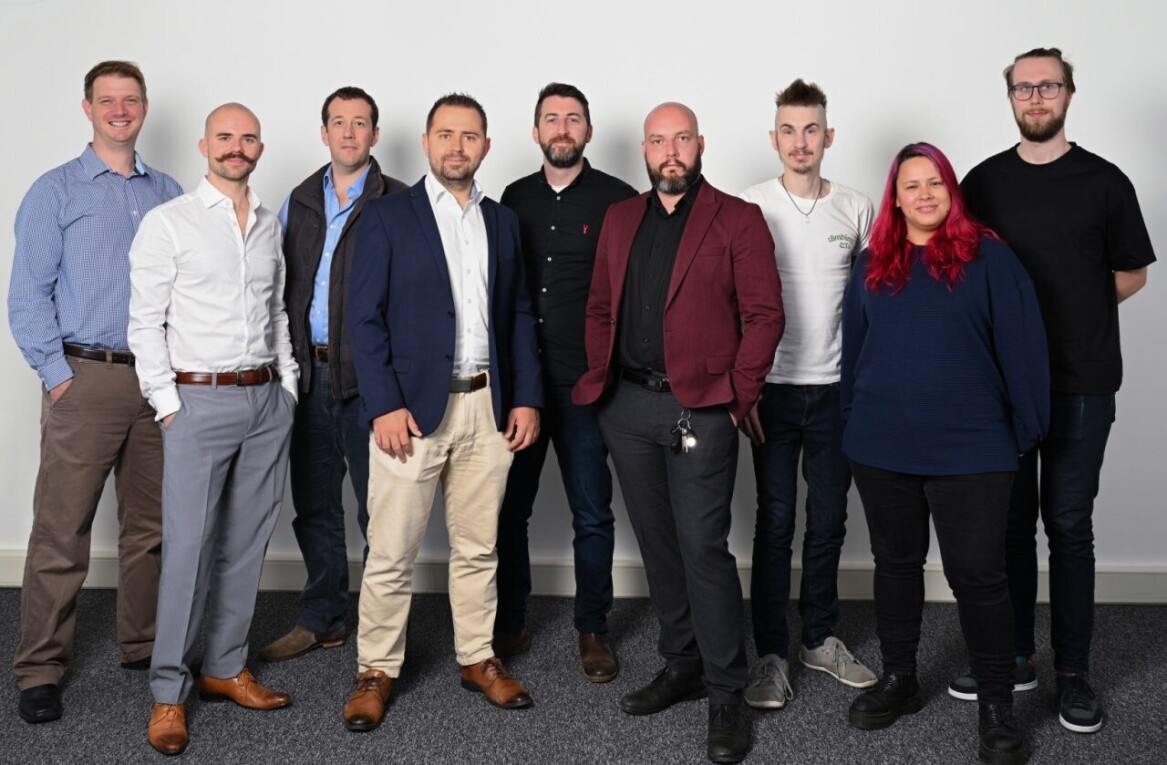
2011 has been one hell of a year for the UK tech scene. From innovative young startups and the London riots, to new apps and breaking industry news, The Next Web has been there every step of the way.
But as we approach the final few days of what has been a tumultuous year for tech, it’s worth us taking a look back and recapping some of the major milestones, key events and quirky tidbits from 2011.
Here’s the UK’s 2011 tech rewind…
The UK startup ecosystem
It would be impractical to name-check every startup we covered this year…this is a recap piece after all. Our feature that explored how startups choose their names focused on a few of our favorite young companies, as did our working on Christmas Day piece from last week.
As England’s capital city and one of the world’s preeminent global cities, London was naturally at the centre of many of our tech stories, but we also explored the Scottish startup scene in some depth, looking at some of the young companies currently working their magic north of the border.
Tech City and London’s so-called Silicon Roundabout got a big look-in this year, and we celebrated 12 months of TechHub, the shared-working space next to Old Street Underground station. There was also a strong focus on tech incubators, with the likes of Ignite100 which was touted as Europe’s first £1m startup accelerator programme, whilst ten startups sprung up at Cambridge-based accelerator programme Springboard. Seedcamp, too, laid out its future plans, and all this before Birmingham-based Oxygen Accelerator unveiled 9 new startups at a London showcase in December.
The Next Web also attended many UK events throughout 2011, including Internet Week Europe which kicked off in London in November. Whilst we hooked up with a number of very cool startups, we also interviewed Wikipedia founder Jimmy Wales and entrepreneur/investor Jasona Calacanis, and we considered what an influx of big tech companies would mean for the UK startup scene. In fact, you can review all our coverage of the week-long event here.
Elsewhere, eBay UK reported a 25% rise in million-pound eBay businesses, and The Next Web caught up with a handful of these companies to see what life was like for them.
The London riots
August was a poignant month in the UK, with the riots that kicked off in London subsequently sweeping across other parts of the UK.
Technology was thrust into the limelight as it emerged that social networking played a key role in organizing the pillaging, and arrests were made in the likes of Wigan and Glasgow after a handful of Facebook users were accused of inciting riots on the social network. And at least one teen girl was charged for similar actions using BlackBerry Messenger (BBM).
We reported that RIM was engaging with police over the role that BBM played in the riots, whilst the UK government was to seek a meeting with key representsatives from Facebook, Twitter and BlackBerry-makers Research in Motion (RIM) to discuss whether it would be right to shut down social networks at certain times. We argued that the government wouldn’t curb social media in times of crisis, and the social networks all later responded to confirm that the meeting was more to do with how they could help the authorities use social media more effectively.
With that in mind, it transpired that some UK authorities were actually using social media to fight crime, with one police force using Flickr to help identify riot suspects, and we later pondered whether Facebook could be effectively used to report crimes.
Wired’s inaugural event in London two months after the riots was also a hotbed for discussion about the riots, with US super-cop and new UK adviser William Bratton discussing data-driven policing and putting cops on the dots, whilst Joanna Shields, Facebook VP for Europe, the Middle East and Africa, talked data privacy and whether the UK government would be enforcing shutdowns in the wake of the London riots. The answer was no, incidentally.
Media, downloads and intellectual property (IP)
2011 saw the UK pass £1bn in digital music sales, but news also emerged that the UK music industry had dropped £190m in revenue in 2010 across the board, including record sales, streaming, downloads and live performances.
Illegal film downloading increased by 30% in the past 5 years as we reported in July, despite efforts to bring legal media streaming and downloading to the online masses. And in what was classed as a major milestone for the Internet in the UK, the country’s biggest Internet Service Provider (ISP) BT was ordered to block access to pirate link-sharing website Newzbin 2. This was followed soon after by news that the Motion Picture Association (MPA) had also pursued Sky which announced it was blocking access. The other major ISPs are expected to follow suit in 2012.
Whilst the UK government announced a peer-to-patent scheme aimed at kick-starting the UK IP revolution, the broader intellectual property (IP) issue received some clarity when the government said that it wouldn’t intervene to block websites that infringed on IP, and it would make it legal to rip music from CDs. Not that you weren’t already doing that, eh?
Oh, and Scotland also secured its very first file-sharing conviction, after Ayr-based Anne Muir admitted distributing £54,000 worth of copyrighted music.
The online movies-on-demand streaming space heated up this year too, with market leader LoveFilm acquired by Amazon back in January, before inking deals with major Hollywood studios such as Warner Bros. in preparation for doing battle with Netflix ahead of its UK launch in early 2012. Movies-on-demand was also rolled out on Sky Go’s mobile service shortly after HMV announced its very own service, whilst YouTube launched its movie-rental service in the UK too.
I think we can expect to see this trend continue into 2012, with other companies entering the increasingly competitive space.
Social media
As we’ve seen already with the London riots, social media has become truly ingrained within UK society. But it can also be distracting, which is why many UK businesses have banned social media at work, but this had little discernible effect on the broader uptake, as Facebook announced earlier this year that half the UK population had an account.
Twitter too continued on an upwards trajectory, as its UK traffic record was broken in May, it then launched a UK-specific blog, and rolled out promoted trends across the country shortly after. The Next Web also managed to catch up with Twitter’s Ryan Sarver in its new UK office to talk about its healthy and viable billion-dollar ecosystem.
Elsewhere, Bambuser’s Executive Chairman Hans Eriksson embarked on a 24-hour trip ’round London, live-streamed in its entirety and guided only by members of the public, a former history student started live-tweeting World War 2, and former UK Prime Minister Tony Blair was unveiled as a guest blogger for Huffington Post on its UK launch.
Finally, who can forget the Tower Bridge Twitter fiasco, when Twitter took the handle @TowerBridge from a man who had set up an automated Twitter stream that reported on events from the point of view of the bridge, and handed it to the official Tower Bridge exhibition.
The UK goes mobile…
Okay, mobile telephones have been around for some time snow, but 2011 heralded the first big wave of contactless payments in the UK, with McDonalds first up, followed by Starbucks which rolled out a similar service to let customers carry out small transactions with their smartphone.
Then there was the UK’s first mobile ticketing service, trialled by Chiltern Railways, whilst Orange announced that its customers would be able buy goods in-store with their mobiles too.
If you’ve never been a big fan of mobile phone contracts, this one may have escaped your attention: Ofcom finally banned 3-year mobile contracts.
We started seeing a long line of mobile apps built on Transport for London’s (TFL) API, such as BusIt London which – as its name suggests – helps you find your way around London using buses, and Bus Guru launched in November, providing live London bus times and optimum routes.
TubeTap was also unveiled to the public to help commuters get refunds on delayed underground journeys, and public transport directions arrived on Google Maps for London commuters too.
The UK government also announced its big open data push based on public sector data. This is with a view towards enhancing travel, healthcare and, ultimately, helping to drive economic growth and boost jobs in the UK. This means lots and lots of apps will likely be coming our way in 2012.
Finally, a number of unpleasant incidents were caught by the smartphone-wielding UK public, which led us to conclude that with the smartphone revolution now in full swing, everyone needs to be on their best behaviour in public.
In other news…
As you can see, we covered a pretty broad range of tech topics this year, but there were many more stories that caught our attention, ones we simply couldn’t ignore.
For example, London’s first electric bike rental scheme was launched by Hertz, an eBay pop-up store opened for Christmas, Sainsbury’s started trialing an iPad-enabled shopping trolley, Apple leapfrogged Argos to become the second biggest online retailer in the UK, and the first Brit to receive an artificial heart came through his operation just fine.
Elsewhere, Google announced it was teaming up with the British Library to bring its vast collection of books online, the BBC’s Domesday project returned 25 years after it was initially launched, the broadcaster said it was to let Wimbledon tennis fans control the sound balance, it declared plans to bring every oil painting in the UK to the Internet, and a new BBC homepage was unveiled.
Website hacking was also a hot topic throughout 2011. LulzSec’s so-called ‘Topiary’ appeared in court, with 18-year-old Jake Davis from the Shetland Islands accused of carrying out a ‘distributed denial of service’ (DDoS) attack on SOCA, in an attempt to crash its computer system. And whilst many people won’t have shed a tear for the demise of the tabloid, Rupert Murdoch finally killed the News of the World newspaper after 168 years in the wake of a series of phone-hacking allegations.
Finally, the UK may be becoming increasingly connected, with smartphones, tablets and computers everywhere, but we announced in November that a whopping 8m Brits have never accessed the Internet…not even once.
So that’s a year in tech from the UK. We hope you enjoyed the recap, and we’re very much looking forward to seeing what new developments 2012 brings us.
Meanwhile, you can find all our 2011 Tech Rewind posts here.
Get the TNW newsletter
Get the most important tech news in your inbox each week.











